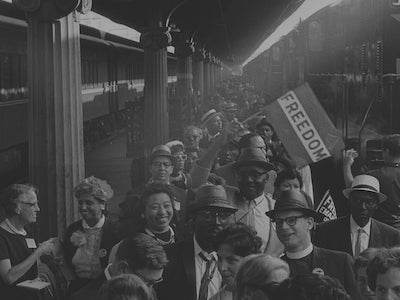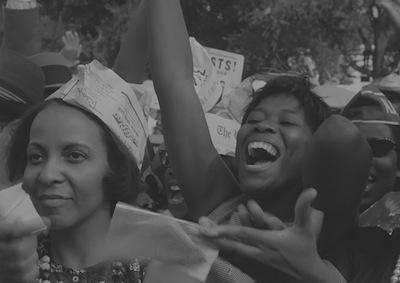Archive events are in Pacific Time (U.S.). This is a one-time live virtual screening.
The March
U.S., 1963
Produced by the United States Information Agency (USIA) for foreign distribution, the acclaimed documentary The March (1963) represents an indelible record of one of the most historic events of the civil rights movement. On August 28, 1963, over 250,000 individuals from across the U.S. assembled to participate in the March on Washington for Jobs and Freedom, a peaceful demonstration intended to spur congressional action to address the gross economic inequalities and fundamental lack of civil rights that were profoundly impacting African American life. Only a few weeks earlier, the USIA, under the leadership of visionaries Edward R. Murrow and motion picture chief George Stevens Jr., had begun planning to capture the march on film. Stevens entrusted the herculean task to the extensive resources of the agency’s frequent partner, Hearst Metrotone News, and more significantly, a singular filmmaker of prodigious talent: James Blue (The Olive Trees of Justice, 1962).
With USIA’s plans in place to distribute the film before year’s end (to counter Soviet propaganda criticizing the dismal U.S. record on civil rights), Blue dispatched seven teams and over a dozen filmmakers across U.S. cities to shoot over 11 hours of footage of participants traveling and marching to the Washington National Mall in D.C. Blue would review every frame of footage, distilling over 50,000 feet of film to an artful 33 minutes that immortalizes Dr. Martin Luther King Jr.’s “I have a dream” speech. The film captures orderly masses assembled in unity to convey the immense scale of the demonstration while expressionistically employing close-ups on the brave, defiant and proud faces of participants to depict the intimacy of the march. Blue not only directed and edited the powerful film — he also wrote and provided the film’s poetic voice-over narration.
While at the time of its release in 1964, Blue’s humanistic achievement was awarded honors in prestigious film festivals from Cannes to Venice, it could not legally screen in the U.S. until 1990, when Congress lifted a domestic ban on USIA films. In 2008, the title was named to the National Film Registry as a historically significant work and in 2013, the film was restored by the National Archives and Records Administration (NARA).
The screening will be followed by a panel featuring George Stevens Jr. and Professor William P. Jones (University of Minnesota), in conversation with Professor David Frank (University of Oregon) and Archive Director May Hong HaDuong. The film will be preceded by introductions by Criss Austin of NARA and Professor William P. Jones.
Digital video, b&w, 33 min. Production: United States Information Agency. Producer: George Stevens Jr. Director: James Blue. Writer: James Blue. With: Martin Luther King Jr., Marian Anderson, Joan Baez, Odetta, Ossie Davis.
Special thanks to the James Blue Alliance and the University of Oregon.
Restored in 35mm by the National Archives and Records Administration, Motion Picture Preservation Lab.







 Mobile Navigation
Mobile Navigation

